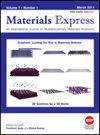Astragalus polysaccharide liposome nanoparticles mediate fatty acid translocase (FAT)/CD36 to improve fatty acid metabolism and regulate glucocorticoid receptor levels in diabetic cardiomyopathy
IF 0.7
4区 材料科学
Q3 Materials Science
引用次数: 0
Abstract
Abnormal myocardial metabolism is the leading cause of diabetic cardiomyopathy (DCM). Astragalus polysaccharide (APS) combination with liposome nanoparticles (APS-nano) exhibits greater efficacy. Therefore, this study assessed regulatory effect of APS-nano on fatty acid translocase (FAT)/CD36. Fifty SD rats were assigned into control group, model group, APS group, APS-nano group, and FAT/CD36 inhibitor group ( n =10, each group), followed by analysis of FAT/CD36 mRNA, protein levels, and glucocorticoid receptor expression. APS-nano group rats had highest level of insulin among all groups and lowest blood sugar. The content of Total cholesterol (TC), triglyceride (TG) and Free Fatty Acid (FFA) in APS-nano group was lower than APS and model groups ( P = 0.000), with higher TC and FFA than control group ( P <0.001), while insulin, blood sugar, TC, TG and FFA in the APS group were lower than model group ( P = 0.000). FAT/CD36 mRNA in the model, APS, and APS-nano groups decreased to varying degrees ( P <0.01). Administration of APS-nano greatly increased glucocorticoid receptor ( P <0.01). APS-nano can regulate FAT/CD36 expression and improve fatty acid metabolism, thereby lowering myocardial tissue metabolism and inhibiting glucocorticoid receptor levels.黄芪多糖脂质体纳米颗粒介导脂肪酸转位酶(FAT)/CD36改善糖尿病心肌病脂肪酸代谢和调节糖皮质激素受体水平
心肌代谢异常是糖尿病性心肌病(DCM)的主要原因。黄芪多糖(APS)与脂质体纳米颗粒(APS-nano)联合使用效果更好。因此,本研究评估了APS-nano对脂肪酸转位酶(FAT)/CD36的调控作用。将50只SD大鼠随机分为对照组、模型组、APS组、APS纳米组和FAT/CD36抑制剂组(每组10只),分析FAT/CD36 mRNA、蛋白水平和糖皮质激素受体表达。aps纳米组大鼠胰岛素水平最高,血糖水平最低。APS-纳米组大鼠总胆固醇(TC)、甘油三酯(TG)和游离脂肪酸(FFA)含量低于APS组和模型组(P = 0.000), TC和FFA含量高于对照组(P <0.001),而APS组大鼠胰岛素、血糖、TC、TG和FFA含量低于模型组(P = 0.000)。模型组、APS组和APS-纳米组FAT/CD36 mRNA均有不同程度降低(P <0.01)。给药后糖皮质激素受体显著升高(P <0.01)。APS-nano可调节FAT/CD36表达,改善脂肪酸代谢,从而降低心肌组织代谢,抑制糖皮质激素受体水平。
本文章由计算机程序翻译,如有差异,请以英文原文为准。
求助全文
约1分钟内获得全文
求助全文
来源期刊

Materials Express
NANOSCIENCE & NANOTECHNOLOGY-MATERIALS SCIENCE, MULTIDISCIPLINARY
自引率
0.00%
发文量
69
审稿时长
>12 weeks
期刊介绍:
Information not localized
 求助内容:
求助内容: 应助结果提醒方式:
应助结果提醒方式:


